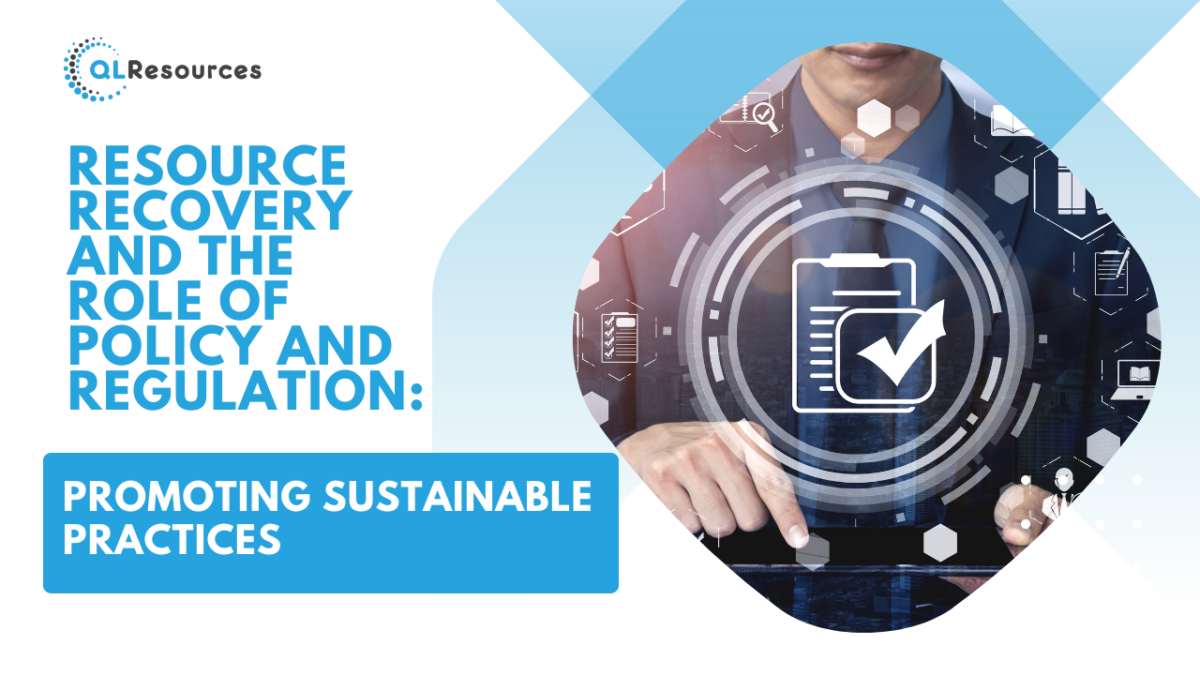Resource recovery, also known as waste recovery or recycling, is a crucial component of sustainable waste management. It involves the collection, processing, and reuse of materials that would otherwise be discarded as waste. In the quest for a circular economy, resource recovery plays a vital role in reducing the environmental impact of waste generation and conserving valuable resources. This blog post explores the significance of resource recovery and the role of policy and regulation in promoting sustainable practices.
The Importance of Resource Recovery:
Resource recovery offers numerous environmental, economic, and social benefits. By diverting waste from landfills and incineration, resource recovery helps mitigate greenhouse gas emissions, reduce energy consumption, and conserve natural resources. Recycling materials like paper, glass, plastic, and metal decreases the need for raw material extraction, thereby preserving natural habitats and biodiversity. Moreover, resource recovery creates job opportunities and fosters a culture of environmental responsibility, contributing to the overall well-being of communities.
Policy Framework for Resource Recovery:
Governments play a pivotal role in driving resource recovery efforts through policy and regulation. Effective policies set the groundwork for waste management practices that prioritise recycling and resource conservation. Policy frameworks may include mandates for waste separation at the source, extended producer responsibility (EPR) schemes, recycling targets, and incentives for businesses to adopt sustainable packaging and product designs. Clear guidelines for waste collection, processing, and disposal create a conducive environment for resource recovery initiatives.
Extended Producer Responsibility (EPR):
EPR is a policy approach that holds manufacturers responsible for the entire lifecycle of their products, including post-consumer waste management. By implementing EPR programs, governments incentivise producers to design products with recyclability in mind and financially support the collection and recycling of their products. EPR encourages manufacturers to adopt sustainable practices, reduce waste generation, and promote the use of recyclable materials.
Recycling Targets and Incentives:
Setting recycling targets provides a measurable benchmark for waste management progress. Governments can establish ambitious targets for specific materials, industries, or regions, encouraging businesses and communities to improve recycling rates. Financial incentives, such as grants, tax breaks, or fee waivers, can further motivate businesses to invest in resource recovery infrastructure and technology.
Public Awareness and Education:
Policy and regulation must be accompanied by robust public awareness and education campaigns. Educating citizens about the importance of resource recovery, waste segregation, and proper recycling practices fosters active community participation. Public support is vital in ensuring the success of resource recovery initiatives, as individuals’ actions significantly impact waste management outcomes.
Collaboration with Private Sector:
Governments can collaborate with the private sector to drive resource recovery efforts. Engaging businesses and industries in sustainable waste management practices, circular supply chains, and product redesign fosters innovation and creates a more sustainable economy. Public-private partnerships can also facilitate investment in advanced recycling technologies and research and development of new recycling processes.
Conclusion:
Resource recovery is a fundamental pillar of sustainable waste management and circular economy principles. By promoting resource recovery through effective policy and regulation, governments can significantly reduce waste generation, conserve natural resources, and mitigate environmental impacts. Extended Producer Responsibility (EPR), recycling targets, financial incentives, public awareness campaigns, and collaborations with the private sector are essential components of a comprehensive approach to sustainable resource recovery. Through concerted efforts and collective action, policymakers, industries, and communities can work together to create a more sustainable and resilient future for our planet.
Join our community and never miss an update! Subscribe to our newsletter and blog to stay up-to-date on the latest trends, tips, and insights in your area of interest. Don’t miss out on exclusive content and promotions. Sign up now and be a part of our growing community!
